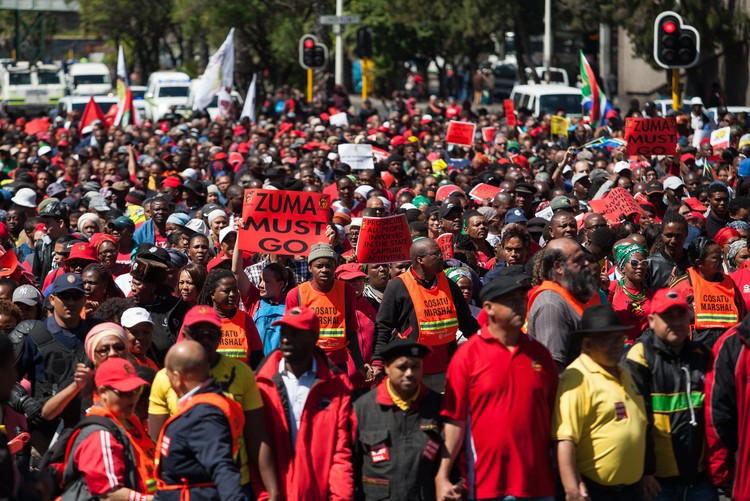In photos: COSATU members protest in cities across the country
Minister of Sport Thulas Nxesi warns workers that pensions may be looted
On Wednesday, thousands of Congress of South African Trade Union (COSATU) members marched in city centres across the country in support of the federation’s call for a national strike day against state capture and corruption. The marches were supported by trade unions NEHAWU and SADTU, as well as the South African Communist Party (SACP), the South African National Civics Organisation (SANCO), and the ANC Women’s League.
The march memorandum stated: “Economic Development continues to be obstructed by the systemic capture of the state by a well-organised predatory elite”. It called for President Jacob Zuma to agree on a date to proceed with the Commission of Inquiry recommended in the Public Protector’s State of Capture report. It also called for the state to “cancel all commercial dealings with the Gupta family with immediate effect.”
Johannesburg
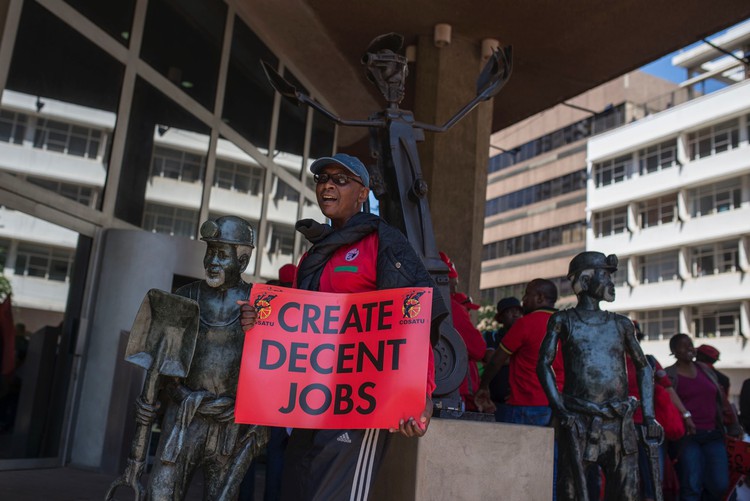
About 5,000 people took to the streets of Johannesburg. COSATU members were joined by members of the SACP, and even some small contingents of people wearing ANC regalia. The protest started at COSATU head office in Braamfontein and made its way to the office of Johannesburg Mayor Herman Mashaba.
A few of the protesters who had joined the march were angry at Mashaba as they had lost their jobs when he cancelled contracts that were entered into by the previous administration. Protesters accused Mashaba of xenophobia and illegally evicting people in the inner city.
Protest leaders called Mashaba a coward for not coming outside to receive the memorandum. The memorandum was signed and received by Mayoral Member for Public Safety Michael Sun. A large contingent of riot police blocked protesters from advancing towards the building housing the mayor.
Protesters then made their way into the Johannesburg city centre where they stopped and handed over memorandums at FNB head office, the office of Gauteng Premier David Makhura, and the Chamber of Mines. Protesters appeared united in their call for President Zuma to step down. Many indicated that they would like Deputy President Cyril Ramaphosa to take over as leader of the ANC.
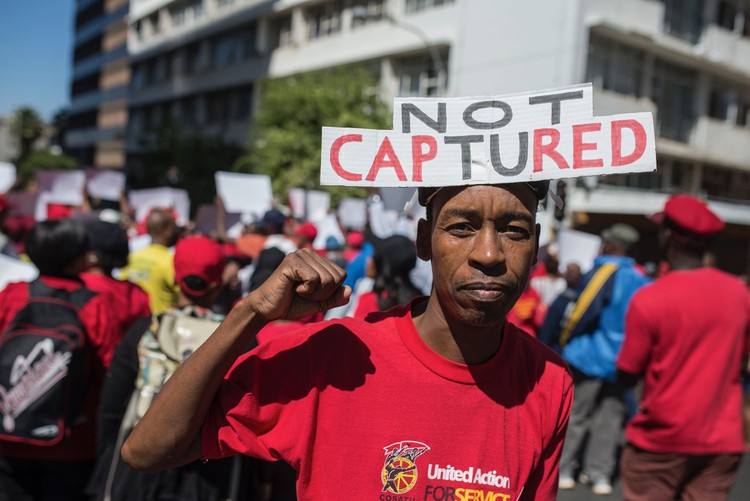
Cape Town
Thousands marched in Cape Town (the City estimated about 2,500 people, but some reporters thought this to be an underestimate). The city centre was quiet and many businesses were closed. Protesters marched from Keizersgracht Street through the city centre, making three stops: the central train station, the Western Cape Provincial Legislature and Parliament.
Demonstrators in red regalia were in a jovial mood. Placards read: “Labour broker slavery”, “Zuma must fall” and “Unemployment is a violation of human rights”. Slogans also denounced the Gupta family.
Tony Ehrenreich, Western Cape Provincial Secretary of COSATU, found no representative to accept the memorandum on behalf Premier Hellen Zille, so it was shoved under the door.
At Parliament the memorandum was received by Mabatho Zungu on behalf of the government and a business representative, Sid Peimer, Executive Director of the Cape Chamber of Commerce.
Ehrenreich said, “We will not replace an apartheid white devil with a black devil. We want a living wage which ensures [that we can] pay bills and take good care of our families. We would like both black and white to benefit from the economy.”
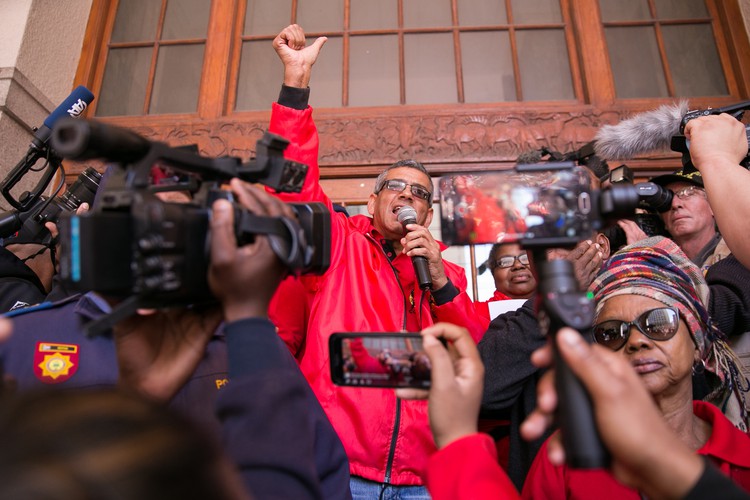
Cape Town’s marchers also called for improved service from Metrorail and MyCiTi buses on the Cape flats. Ehrenreich stressed the poor service and safety of the city’s public transport system. He also called on workers to play their part by reporting and discouraging vandalism of public transport infrastructure.
PRASA regional manager Richard Walker accepted the memorandum. Later he told GroundUp that if criminality in and around stations as well as attacks on the train infrastructure are not dealt with, bringing new trains to the Western Cape will be a “futile exercise”.
Durban
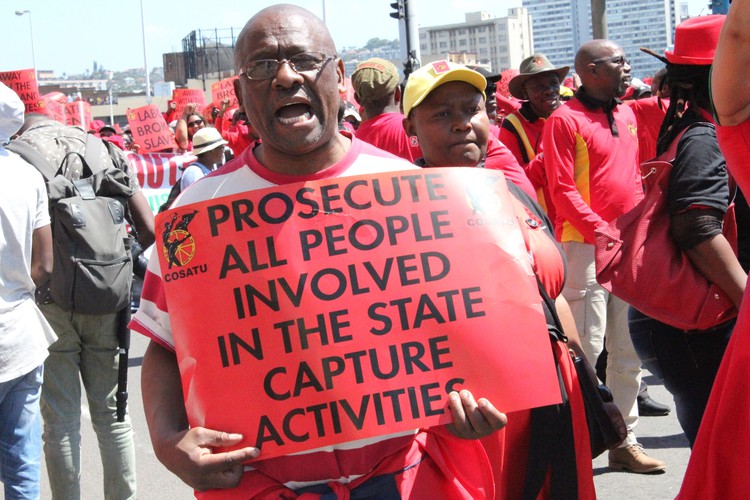
COSATU supporters marched from King Dinuzulu Park to Durban’s City Hall. Photo: Nomfundo Xolo
In Durban thousands marched from King Dinuzulu Park. The crowd gained momentum as more and more people arrived in buses with placards and banners. Many of the placards raised demands to sack labour brokers, comparing labour broking to human trafficking and slavery. Placards also called for decent jobs and the prosecution of those involved in state capture.
Marchers stopped regularly to chant and dance. At one point people sang, “We are ready for Ramaphosa” and “Guptas are dogs”. After almost three hours, the marchers arrived at the City Hall where COSATU President S’dumo Dlamini addressed the crowd.
Port Elizabeth
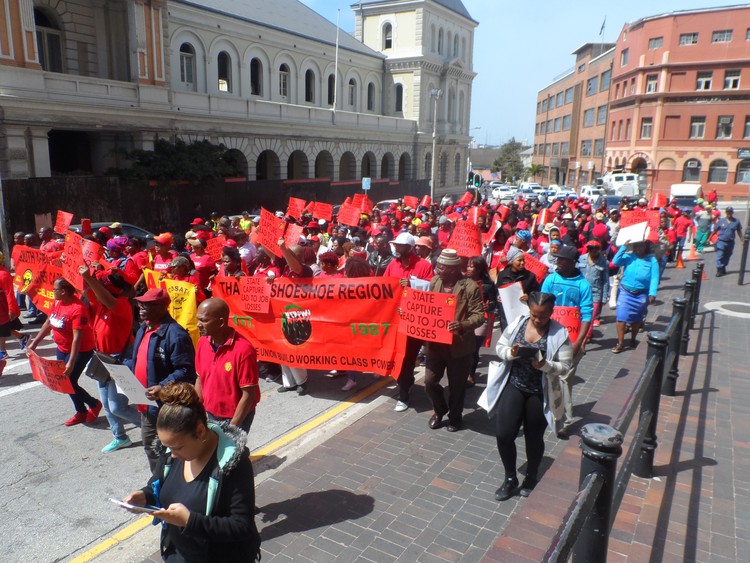
About 300 people marched in Port Elizabeth. Protesters called for President Zuma to step down. They accused him of wrecking the economy.
Minister of Sport and Recreation Thulas Nxesi addressed the crowd. He said, “All labour organisations should know who is managing your retirement funds.” This was a reference to the Public Investment Corporation (PIC), which is responsible for the pensions of civil servants. A key concern of workers is that corrupt people in government intend to find ways to raid the PIC, instead of investing its funds wisely. “You should know who decides your pension investments because the only investment a worker has is his retirement fund. The looting of workers resources is taking away our lives,” said Nxesi.
“Billions of rands are needed to bail out the South African Airways. SAA is in crisis. It has been financially mismanaged. Looting of Eskom has pushed up the price of electricity. We grew up knowing that Eskom, Prasa and other state owned companies were good employers, but now thousands of innocent workers are threatened with losing their jobs,” Nxesi said. “All these companies are the footprint of the Gupta corruption. Some officials have forgotten why they are in office. We say to the Hawks: do your job. Look for the people who are doing the wrong things and arrest them.”
East London
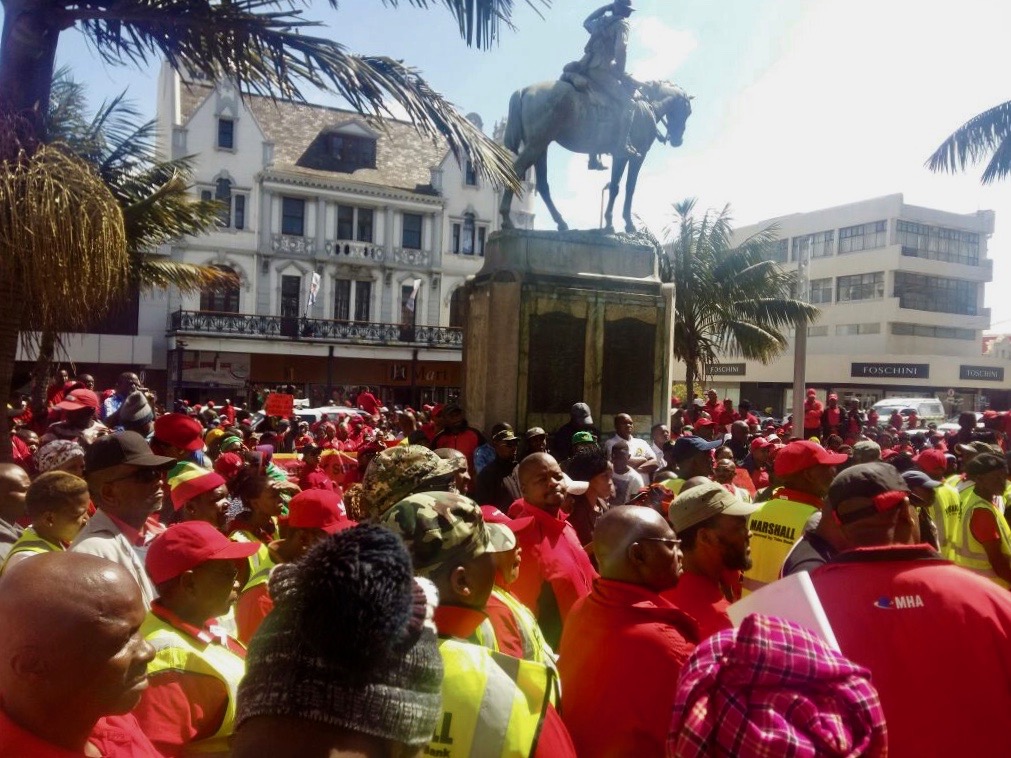
More than 300 people marched in East London from North End Stadium to the city hall.
Many, like Bonana Magayi, a nurse from Pedi, travelled from the rural areas of the Eastern Cape to take part in the march. “The time to be silent is over. We as the working class should stand up. We are affected by every corruption that happens. It is time for us to fight not only for us but our children and the future generation of this country,” said Magayi.
A memorandum was received by Joseph Sotshana from the office of the premier. He apologised for the absence of the premier and promised that a response would be forthcoming within 14 days.
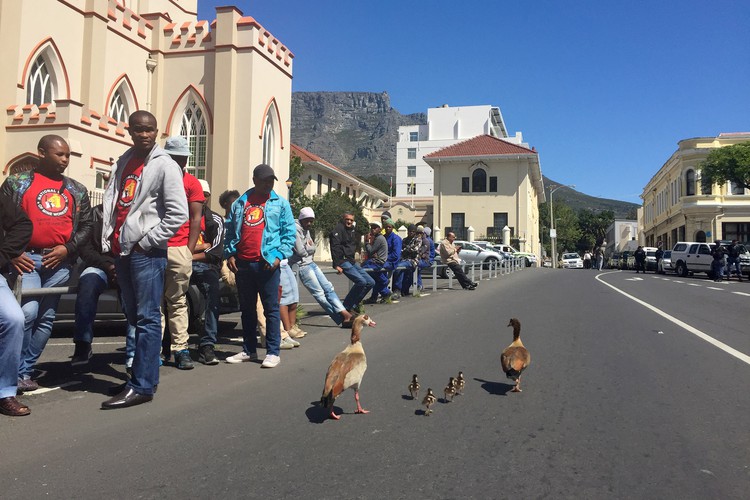
Next: UCT invites “conspiracy theorist” to talk about decolonisation of science
Previous: Wage strike at Leeuwenkuil vineyards
Letters
Dear Editor
I must register my outrage at the speciesist language used by Ground Up in the caption to Ashraf's Hendricks excellent photograph of Egyptian Geese who joined the Cosatu march. The caption thoughtlessly described the Geeses' presence as mere "wandering".
Your use of this dismissive language is prejudicial against other species implying that they lack capacity for intelligent purposeful behaviour in pursuit of their own interests. These geese were not "wandering". They were in pursuit of survival and displaying the same behaviour as is driving Mr. E. Musk to seek refuge on Mars.
Your caption represents the gross speciesism typical of the entire Judeo-Christian tradition. It suppresses the identity of other species by robbing them of agency. I am certain that march was full of vetkoek, slap chips, bunny chows and other delicacies (though I suspect only a limited amount of sushi) that more than justified the progressive role of geese in cleaning up other species crap.
I trust we shall see a more purposeful attempt to avoid speciest language on your otherwise estimable publication. To help you improve in this I conclude with a definition of speciesism:
'Speciesism' is the idea that being human is a good enough reason for human animals to have greater moral rights than non-human animals. ... a prejudice or bias in favour of the interests of members of one's own species and against those of members of other species. Peter Singer, Animal Liberation, 1975.
© 2017 GroundUp. 
This article is licensed under a Creative Commons Attribution-NoDerivatives 4.0 International License.
You may republish this article, so long as you credit the authors and GroundUp, and do not change the text. Please include a link back to the original article.

